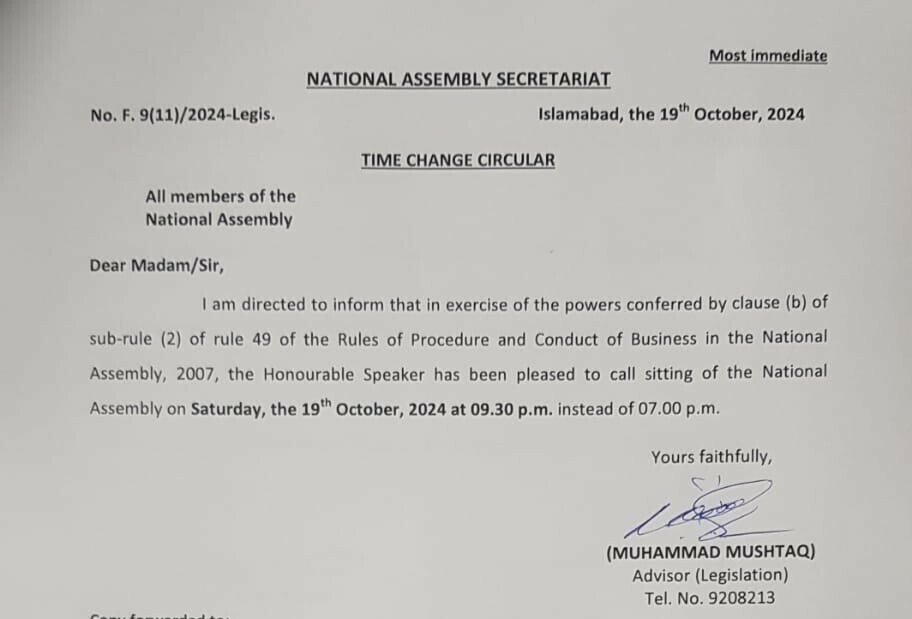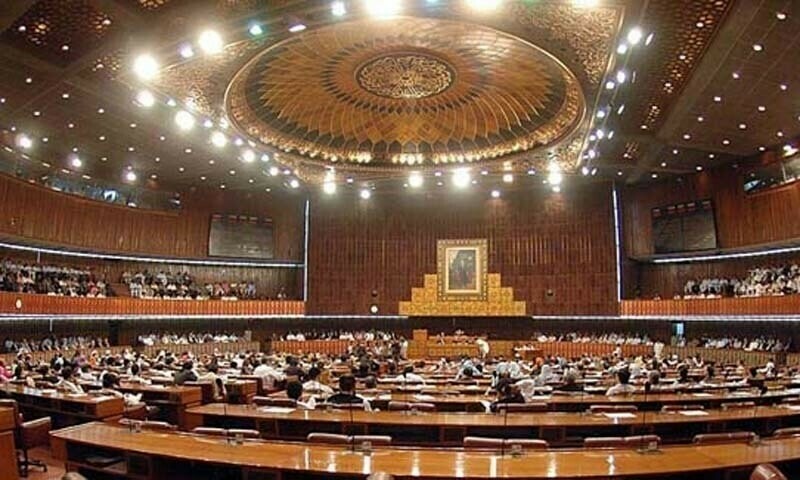Constitutional Package
In a bid to secure the passage of the much-discussed 26th constitutional amendment, ministers of the federal government asserted on Saturday that they possess the necessary number of lawmakers for approval.
Following several delays, the government is set to convene to discuss a judicial reform package while both the National Assembly and Senate sessions are expected to resume afterward.
The proposed constitutional package includes a range of amendments, notably an extension of the chief justice’s term. A special parliamentary committee, which includes representation from all political parties, including the Pakistan Tehreek-e-Insaf (PTI), has been engaging in discussions to refine the various proposals.
On October 11, the Pakistan Peoples Party (PPP) made its proposals public, and subsequently, they reached an agreement with the Jamiat Ulema-i-Islam-Fazl (JUI-F) on a draft bill.
Originally, the federal cabinet was scheduled to convene on Friday evening, but the meeting was postponed several times, first to Saturday morning, then from 9:30 a.m. to 2 p.m., ultimately leading to a delay that has yet to be resolved.
The National Assembly’s session was adjourned until 3 p.m., only for the time to be pushed to 7 p.m. and then to 9:30 p.m. Similarly, the Senate session, which was supposed to resume at 12:30 p.m., faced multiple delays, eventually scheduled for 8 p.m.

During a press conference at Parliament House, Information Minister Attaullah Tarar indicated that the consultation process is ongoing, with the government aiming for a complete consensus among political parties.
Tarar emphasized the importance of bringing all parties on board, stating, “When a constitutional amendment occurs, we must ensure a thorough debate on every clause to reach a logical conclusion.” He asserted that this amendment is receiving unprecedented attention and debate compared to previous ones.
Tarar also mentioned that while there are alternative approaches available for the government, they are committed to fostering consensus before proceeding.
Defence Minister Khawaja Asif reiterated this stance, highlighting the need for a broad consensus across both houses of parliament to ensure the legislation’s success.
He emphasized the importance of restoring parliamentary supremacy, as guaranteed in the Constitution, and expressed hope for reaching a consensus by the evening.
As discussions continued, PPP Chairman Bilawal Bhutto-Zardari visited Maulana Fazlur Rehman’s residence to solidify support from opposition parties.
Following their meeting, Bilawal announced that the PPP and JUI-F are in complete agreement regarding the draft bill for the constitutional package. He encouraged Maulana Fazlur Rehman to present their joint proposal in parliament, reinforcing their collaborative approach to the amendments.
Meanwhile, Balochistan National Party-Mengal (BNP-M) chief Akhtar Mengal maintained his opposition to the proposed amendments, declaring that his party would withhold support until the release of party senators allegedly abducted by authorities.
Mengal criticized the lack of transparency in the amendment process, expressing concern over differing drafts circulated among various parties.
In a separate development, PTI Chairman Imran Khan, currently incarcerated, instructed his party to maintain dialogue with Maulana Fazlur Rehman. PTI leaders expressed dissatisfaction with how the government has attempted to pass the amendments, emphasizing the need for proper consultation and consensus.
The proposed amendments aim to limit the Supreme Court’s suo motu powers and establish the chief justice’s term at three years, with the prime minister empowered to appoint the next chief justice from the three most senior judges. A major point of contention remains the proposal for a Federal Constitutional Court, which PTI opposes, while JUI-F has called for a constitutional bench.
As negotiations continue amid allegations of intimidation and coercion within the opposition, the atmosphere in parliament remains tense.
Fazl’s residence has become a focal point for discussions, as various political factions seek to navigate the complexities of the proposed constitutional changes.
While the government insists it has the numbers to pass the amendments, the ongoing dialogue and concerns from various parties illustrate the challenges ahead in achieving a comprehensive consensus.
I am a dynamic professional, specializing in Peace and Conflict Studies, Conflict Management and Resolution, and International Relations. My expertise is particularly focused on South Asian Conflicts and the intricacies of the Indian Ocean and Asia Pacific Politics. With my skills as a Content Writer, I serve as a bridge between academia and the public, translating complex global issues into accessible narratives. My passion for fostering understanding and cooperation on the national and international stage drives me to make meaningful contributions to peace and global discourse.










